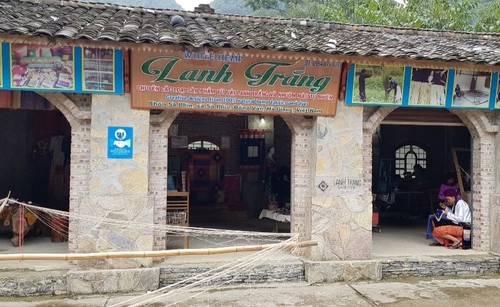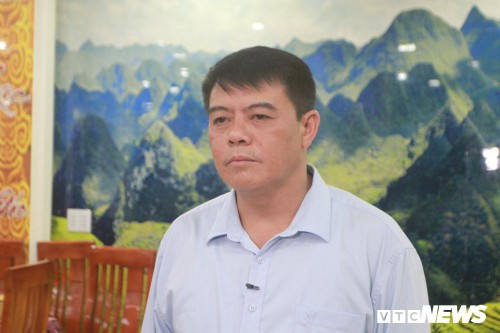 Sa Phin A commune’s agriculture and forestry cooperative is an outstanding poverty reduction model in Dong Van district. (Photo: Ngoc Anh/VOV5) Sa Phin A commune’s agriculture and forestry cooperative is an outstanding poverty reduction model in Dong Van district. (Photo: Ngoc Anh/VOV5) |
Dong Van district has 19 communes and a town populated mainly by ethnic minorities. 87% of them are Mong. The local administration considers economic development, poverty reduction, and new rural area building to be its top priorities.
A plan adopted two years ago has already helped 30 of 46 hamlets escape poverty.
Each year, Dong Van reviews and reclassifies households as poor, near-poor, or average. Access to preferential loans to develop breeding, cultivation, and handicrafts is based on this classification.
To compensate for rocky terrain and a lack of water, Dong Van’s agriculture sector has encouraged local farmers to switch to new crops and livestock, such as pear trees and corn and rice hybrids that do better in these conditions.
 Dinh Chi Thanh, Deputy Chairman of the Dong Van People’s Committee. Dinh Chi Thanh, Deputy Chairman of the Dong Van People’s Committee. |
Dinh Chi Thanh, Deputy Chairman of the Dong Van People’s Committee, said: “We mainly raise cows. Growing silage grass has created a nutritious food source for our cows and preserved their valuable highland cow genes. We have also focused on beekeeping. Dong Van now has 17,000 colonies of bees and about 1,200 ha of material zones growing mint trees for bees.
"We earn about 1.9 million USD a year from 8 tons of honey. Beekeepers can borrow 43 USD without interest for 24 months for each bee colony. This policy has helped poor households boost their production.”
Buckwheat is a crop that has earned good profits for Dong Van. It is used to make cakes, tea, and wine. Dong Van district grows the most buckwheat trees in Ha Giang province. The annual Dong Van Buckwheat Festival attracts many domestic and foreign tourists and provides a significant source of revenue for the locality.
The local administration has promoted good production and trading models like the flax weaving cooperative that is part of Sa Phin A commune’s agriculture and forestry cooperative.
The cooperative was given a loan of 13,000 USD to develop a flax material zone, lease production premises, and buy equipment.
Vang Thi Cau, head of the production team of the Sa Phin A commune’s agriculture and forestry cooperative, also known as the White Flax Cooperative, told VOV: “The cooperative has created jobs for 95 women in Dong Van. Last year, the district Women's Association and the cooperative organized two vocational training classes and established 3 teams in association with the cooperative.
"The average income of cooperative members is between 170 and 260 USD a month. Over the past 8 months, the output has been stable. Cooperative members have never been unemployed. We need to expand the market and create more jobs for women.”
Deputy administrator Thanh said Dong Van’s government has worked hard to mobilize social resources for poverty reduction.
“We have called on organizations and individuals to help poor households. Each year we raise more than 430,000 USD, which is used to get people involved in production models to escape poverty. The district has focused on creating economic models for brocade weaving, handicrafts, and mutual assistance. The model of the White Flax Cooperative has been expanded to 2 other places: the Lo Lo ethnic culture village in Lung Cu commune and the Lung Cam cultural tourism village in Sung La commune,” said Thanh.
Living conditions in Dong Van district have improved remarkably. The poverty rate has fallen more than 6% a year. Investment has been made in infrastructure.
By next year Dong Van hopes to remove all communes from the list of extremely disadvantaged villages.